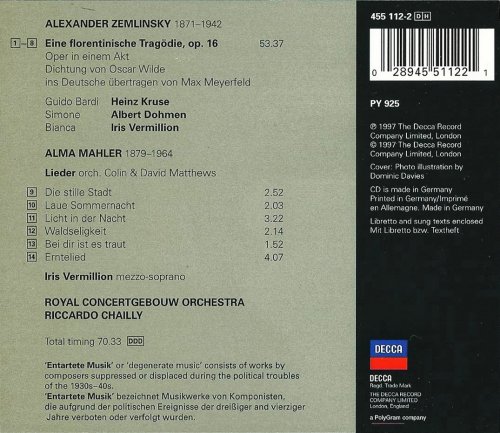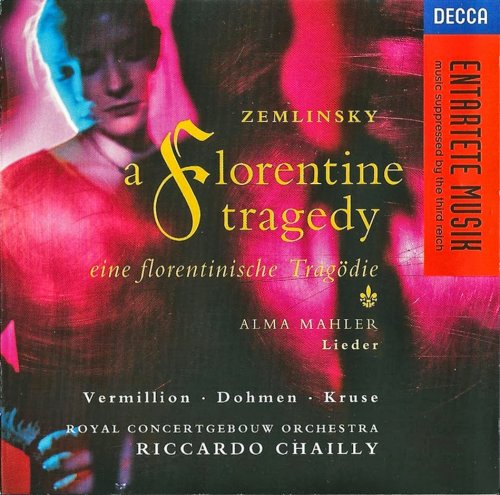
Riccardo Chailly - Zemlinsky: A Florentine Tragedy (1997)
BAND/ARTIST: Riccardo Chailly
- Title: Zemlinsky: A Florentine Tragedy
- Year Of Release: 1997
- Label: Decca
- Genre: Classical
- Quality: FLAC (image+.cue,log,scans)
- Total Time: 01:10:27
- Total Size: 352 Mb
- WebSite: Album Preview
Tracklist:
01. Eine Florentinische Tragödie, opera, Op. 16- Ouvertüre [0:04:31.38]
02. Eine Florentinische Tragödie, opera, Op. 16- So langsam, Weib- [0:14:23.30]
03. Eine Florentinische Tragödie, opera, Op. 16- Spinn ein Kleid, getauchet in purpur [0:02:11.12]
04. Eine Florentinische Tragödie, opera, Op. 16- Was gibt es Neuse, mein Prinz- [0:04:42.48]
05. Eine Florentinische Tragödie, opera, Op. 16- Wie er gleich eeinem schalen Krämer spricht! [0:04:38.52]
06. Eine Florentinische Tragödie, opera, Op. 16- Was ist das- [0:07:15.35]
07. Eine Florentinische Tragödie, opera, Op. 16- Holdsel'ge Bianca [0:06:19.18]
08. Eine Florentinische Tragödie, opera, Op. 16- Simone, jetzt muß ich nach Hause gehen [0:09:47.67]
09. Die stille Stadt (-Liegt eine Stadt im Tale-), for voice & piano (5 Songs (1910)) [0:02:55.00]
10. Laue Sommernacht, for voice & piano (5 Songs (1910)) [0:02:06.00]
11. Licht in der Nacht, for voice & piano (4 Songs (1915)) [0:03:24.00]
12. Waldseligkeit for voice & piano (4 Songs (1915)) [0:02:15.55]
13. Bei dir ist es traut, for voice & piano (5 Songs (1910)) [0:01:55.20]
14. Erntelied (-Der ganze Himmel glüht in hellen Morgenrosen-), for voice & piano (4 Songs (1915)) [0:04:09.00]
Performers:
Heinz Kruse - tenor
Albert Dohmen - baritone
Iris Vermillion - mezzo-soprano
Concertgebouw Orchestra
Riccardo Chailly – conductor

01. Eine Florentinische Tragödie, opera, Op. 16- Ouvertüre [0:04:31.38]
02. Eine Florentinische Tragödie, opera, Op. 16- So langsam, Weib- [0:14:23.30]
03. Eine Florentinische Tragödie, opera, Op. 16- Spinn ein Kleid, getauchet in purpur [0:02:11.12]
04. Eine Florentinische Tragödie, opera, Op. 16- Was gibt es Neuse, mein Prinz- [0:04:42.48]
05. Eine Florentinische Tragödie, opera, Op. 16- Wie er gleich eeinem schalen Krämer spricht! [0:04:38.52]
06. Eine Florentinische Tragödie, opera, Op. 16- Was ist das- [0:07:15.35]
07. Eine Florentinische Tragödie, opera, Op. 16- Holdsel'ge Bianca [0:06:19.18]
08. Eine Florentinische Tragödie, opera, Op. 16- Simone, jetzt muß ich nach Hause gehen [0:09:47.67]
09. Die stille Stadt (-Liegt eine Stadt im Tale-), for voice & piano (5 Songs (1910)) [0:02:55.00]
10. Laue Sommernacht, for voice & piano (5 Songs (1910)) [0:02:06.00]
11. Licht in der Nacht, for voice & piano (4 Songs (1915)) [0:03:24.00]
12. Waldseligkeit for voice & piano (4 Songs (1915)) [0:02:15.55]
13. Bei dir ist es traut, for voice & piano (5 Songs (1910)) [0:01:55.20]
14. Erntelied (-Der ganze Himmel glüht in hellen Morgenrosen-), for voice & piano (4 Songs (1915)) [0:04:09.00]
Performers:
Heinz Kruse - tenor
Albert Dohmen - baritone
Iris Vermillion - mezzo-soprano
Concertgebouw Orchestra
Riccardo Chailly – conductor
Zemlinsky’s Florentine Tragedy is a disturbing, shocking piece, but to make its fullest impact it also needs to sound ravishingly beautiful. As the wealthy merchant Simone shows Count Bardi (his wife’s lover, as he already suspects) a robe of silver damask so exquisitely wrought with roses “that they lack perfume only to cheat the wanton sense” or, later, describes to him another of Venetian cut velvet patterned with pomegranates each seed of which is a pearl, we should almost be able to see these marvels. Zemlinsky’s sumptuous scoring at these points urgently needs, in short, an orchestra of the Royal Concertgebouw’s stature, and in this reading they sound quite magnificent. But the score also needs a conductor of subtlety and shrewdness to point up the fact that there are two passages of serene lyricism which are placed in high relief by all this richness. They occur in a brief scene where Simone’s wife Bianca, left alone for a moment with Count Bardi, assures him of her eternal love and, later, after Simone has murdered his rival, when husband and wife stare at each other, her passion for him awakened by his unexpected brutal strength, he awakened to her beauty by the fact of her adultery.
Vermillion is very fine at both these points, her mezzo timbre (the role is properly for soprano) adding warmth to her finely drawn line. Kruse is admirable too, fining down his ringing tenor in that duet scene, and in the most demanding role, that of Simone, Dohmen is forceful and dangerous, with bass blackness and baritone urgency both at his command. But Chailly is the real star of the performance, pacing the opera so well that it seems over in no time, drawing richly complex but never muddy textures from his remarkable orchestra.
If Zemlinsky needs the Concertgebouw, my first thought on hearing the Alma Mahler songs was that what they have been needing all these years is orchestration. The Matthews brothers’ scoring points up her kinship with Zemlinsky (her teacher) and allows her vocal lines to expand in a way that her piano versions can seem to inhibit. She might have written a fine opera, on a subject as gamey as those Zemlinsky himself sought out. But here again, exquisitely though Vermillion sings these songs, Chailly must take at least half the credit. Each song is taken faster than in most recordings with piano, and every one of them gains from it in impulsive urgency. In both Zemlinsky’s opera and Alma Mahler’s songs the recording leaves nothing to be desired: the colours are rich but beautifully clean. – Michael Oliver
Vermillion is very fine at both these points, her mezzo timbre (the role is properly for soprano) adding warmth to her finely drawn line. Kruse is admirable too, fining down his ringing tenor in that duet scene, and in the most demanding role, that of Simone, Dohmen is forceful and dangerous, with bass blackness and baritone urgency both at his command. But Chailly is the real star of the performance, pacing the opera so well that it seems over in no time, drawing richly complex but never muddy textures from his remarkable orchestra.
If Zemlinsky needs the Concertgebouw, my first thought on hearing the Alma Mahler songs was that what they have been needing all these years is orchestration. The Matthews brothers’ scoring points up her kinship with Zemlinsky (her teacher) and allows her vocal lines to expand in a way that her piano versions can seem to inhibit. She might have written a fine opera, on a subject as gamey as those Zemlinsky himself sought out. But here again, exquisitely though Vermillion sings these songs, Chailly must take at least half the credit. Each song is taken faster than in most recordings with piano, and every one of them gains from it in impulsive urgency. In both Zemlinsky’s opera and Alma Mahler’s songs the recording leaves nothing to be desired: the colours are rich but beautifully clean. – Michael Oliver

Classical | FLAC / APE | CD-Rip
As a ISRA.CLOUD's PREMIUM member you will have the following benefits:
- Unlimited high speed downloads
- Download directly without waiting time
- Unlimited parallel downloads
- Support for download accelerators
- No advertising
- Resume broken downloads


